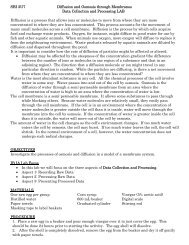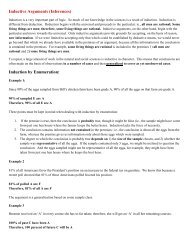Some Basic Logical Fallacies
Some Basic Logical Fallacies
Some Basic Logical Fallacies
Create successful ePaper yourself
Turn your PDF publications into a flip-book with our unique Google optimized e-Paper software.
Ad verecundiam (Shame): (Latin: Verecundia: “shame”). This fallacy, otherwise known as the fallacy of misplacedauthority, consists of appealing to the testimony of an authority on an issue that is outside his or her proper field ofexpertise."My doctor assured me that Fords are the best cars. Therefore, I'm going to buy a Ford. After all, he is a doctor."Consulting Nobel Prize winners in Chemistry, Physics, and Medicine in order that they may shed light on world issuesand offer political solutions to the world's problems is also an instance of the fallacy of misplaced authority. Anothermode of this fallacy consists in appealing to an authority in order to shame an opponent in debate: “Who are you to argueagainst his point of view. He’s got a Ph.D. What do you have?”Ad Populum (The Fallacy of Appeal to the People): This fallacy occurs when a speaker attempts to get some group toagree to a particular position by appealing solely to their bigotry, biases, and prejudices or, in some cases, merely to theirdesire to hear what they already believe. As an example, consider the election when Canadian politicians appealed to thepeople's fears about medicare and began to accuse the Conservative Party (then Alliance Party) of advocating a two tieredheath care system. They were appealing to their prejudices, but they were not engaged in rational argument.The Fallacy of Appeal to Ignorance: I have been tempted to call this the fallacy of an appeal to awareness. Very oftena person will imply that a claim is false because he or even most people are unaware of what it is one is claiming to be thecase. In her interview with Ben Shapiro, Alyona Minkovski began by asking viewers: “When you watch some of themost popular television shows, do you feel like you’re being brainwashed to conform to a Liberal agenda?” The answer,for most people, is clearly no. But that is irrelevant. No conclusion can be drawn from this fact; for if a person is aliberal, then they are not going to feel as if they are being “brainwashed to conform to a Liberal agenda”. If a person isnot a liberal, he or she might see things differently. Who sees more clearly? Awareness or lack of awareness does notsettle the issue. I was completely unaware of how inappropriate prime time television was until I started watching TVwith my 5 year old daughter. When I travel through the American South or through the province of Quebec, I am notaware of any racism towards black people, but that does not mean there isn’t any. Two of my black colleagues are veryaware of being treated differently in these places; my lack of awareness is the result of the fact that I am not black.The fallacy of appeal to ignorance occurs whenever someone concludes that a claim is false because it has not beenproved to be true, or is true because it has not been proved to be false. For example, “Much effort has been spent tryingto show that people do not communicate with one another through mental telepathy, and yet no one has succeeded inshowing that telepathy does not occur. That is why we argue that communication through mental telepathy occurs”. Or,after listening to a debate, one says something to the effect that: “For all we know, he could be making this up; perhapssomeone could argue the opposite. Who’s to know?”The Fallacy of False Cause (Post Hoc Ergo Propter Hoc): This fallacy consists in assuming that when one event precedesanother, it is the cause of the succeeding event. Consider the following:“On the road I travel to the mall in Wheaton, Md., two white men severely beat two black women Tuesday. One wasdoused with lighter fluid, and her attacker tried to set her afire. Both men cursed the women for being black. I couldn'thelp but shudder: That could have been me. This heinous act happened only hours after Pat Buchanan voters gave him 30percent of the vote in the Maryland GOP presidential primary." — USA Today columnist and former "Inquiry" pageeditor Barbara Reynolds, March 6, 1992.”The Fallacy of Begging the Question: This involves assuming the point that needs to be proven. One ends up arguing ina vicious circle. For example, to show that abortion is a basic right and thus should be enshrined in law, a person argues:All rights should be enshrined in law.Abortion is a basic human right.Therefore, abortion should be enshrined in law.The problem is that the person must show that abortion is a basic human right. He merely assumes the point that he needsto establish.As an example, consider the following argument for Same-Sex Marriage legislation:
















